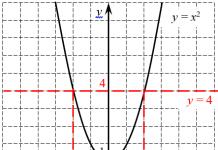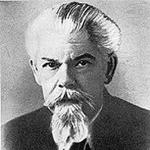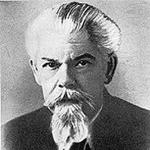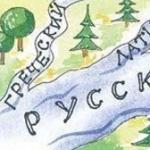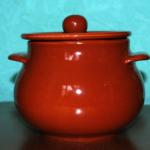Difficult plural forms of nouns
Among the forms of nouns, the formation of which may be associated with certain difficulties, one should include the plural forms of the nominative case ( directors or directors, valves or valve?) and the genitive plural form of some nouns ( five grams and five grams, five oranges or five orange?)
1. Plural forms of the nominative case of nouns: directors or directors?
The nominative plural form of nouns is checked in dictionary order (according to the dictionary). See rubric "Word Check" on our portal. Please note: the search for a word in dictionaries is carried out by the initial form ( Nominative case, singular)!
The dictionary entry reads as follows: if the entry does not contain special indications of the plural form (litter pl.), then the ending is used to form the nominative plural -and or -s. If a different ending is required (or options are acceptable), then a litter is put: pl. -a. For example:
In the modern Russian literary language, options that fluctuate in the form of them. n. pl. h., have over 300 words. The focus of distribution of flexion -and I) are spheres of vernacular and professional language. For this reason, the forms -and I) often have a colloquial or professional coloring: contracts, locksmith, turner. The forms on -s(s) more neutral and for most words meet traditional norms literary language. However, in some cases the forms -and I) have already supplanted the forms on -s(s).
In addition, you can remember a number of patterns that facilitate the choice of inflection (ending) of the nominative plural:
Declinable neuter nouns, the initial form of which ends in -KO, have unstressed plural inflection. h. im. P. -and (faces, feathers, apples). The exception is nouns with stressed plural endings. hours: troops and clouds.
Other neuter nouns in plural form. h take the ending -and I): swamps, fields, seas, windows.
Form on -and I some words may be singular or predominant: side - sides (sides only in phraseological combination hands to the sides); century - century (eyelids only in phraseological combinations for once, forever and ever, forever and ever), eye - eyes, meadow - meadows, fur - furs, snow - snow, stack - stacks, silk - silk.
Forms can have different meanings: tones(about color) and tones(about sound) of bread(about cereals) and loaves(about baked bread) workshops and workshops(at the enterprise) and workshops (medieval organizations artisans).
Noun forms can vary according to stylistic coloring: sides and outdated. sides; at home and outdated. houses; stern and outdated. stern; horns and outdated. and a poet. horns; varieties and outdated. varieties; volumes and outdated. then we, as well as thunders and a poet. thunder; coffins and a poet. coffin.
Finally, noun forms can be equal and interchangeable: of the year and years(but: years of youth, severe deprivation; nineties, zero years), workshops and workshops(at the enterprise), storm and storms.
In order to resolve the issue of the status of the "controversial" form of the word (non-normative, variant, stylistically colored, etc.), in any case, you need to refer to the dictionary.
Non-standard plurals are formed in words child - children, man - people, bottom - bottom and some others.
2. Plural forms of the genitive case of nouns: five grams or five grams?
For most masculine nouns that end in a hard consonant in their initial form ( orange, tomato, fly agaric, computer, sock), characteristically ending -ov in the genitive plural form: oranges, tomatoes, fly agarics, computers, socks etc. An extensive number of exceptions can be distinguished from this rule - similar nouns, but having the genitive plural in the form null ending: one stocking - no stockings, one Ossetian - five Ossetians, one gram - five grams and five grams etc. These words include:
Names of people by nationality and by belonging to military formations, mainly used in plural forms in a collective meaning: Magyars - Magyars, Turkmens - Turkmens, midshipmen - midshipmen and midshipmen, partisans - partisans, soldiers - soldiers; this also includes the form r. n. pl. h. human.
Names of paired items: boots - boot, eyes - eyes, cuffs - cuffs, shoulder straps - shoulder strap, stockings - stocking, epaulettes - epaulette, boots - boots.
Names of measures and units of measurement: 220 volts, 1000 watts, 5 amps, 500 gigabytes. If such names are used outside the "measuring" context (in other words, the genitive form is not countable), then the ending is used -ov: live without excess kilograms, not enough gigabytes.
It should be noted that the names of fruits, fruits and vegetables, which are masculine nouns, in the initial form ending in a solid consonant ( orange, eggplant, tomato, tangerine), in the genitive plural form. hours have an ending -ov: five oranges, a kilogram of eggplant, New Year without tangerines, tomato salad.
For some nouns, the formation of plural forms. h. n. difficult; these are the words dream, prayer, head. On the contrary, words cheek and woodworker do not have other forms, except for the plural form. h. case.
See: "Russian Grammar", M., 1980.
A noun is a part of speech that carries the meaning of objectivity and has such grammatical categories as gender, number and case. These categories are closely interrelated, so their knowledge is necessary for correct use nouns. Special attention should be paid to the declension of nouns in plural.
Grammatical category of number
A grammatical category is a system of opposing sets of forms that have the same meaning. In Russian, names and verbs have the category of number. It is represented by the opposition of singularity and plurality. AT Old Russian there was a three-term system of the category of number, in which the singular, plural and
Expressing the grammatical meaning of a number
Currently in Russian there is only an opposition between the singular and the plural. There are no separate forms for expressing only the category of number. Synthetic and analytical methods are used to express the number. The first, main, case involves the use of an internal word resource. These are, first of all, the ending (house - houses, cat - cats, road - roads), in some cases suffixes (calf - calves, honey agaric - mushrooms, sky - heaven) and sometimes stress (forest - forests) or alternation of consonants ( ear - ears, friend - friends). The analytical (syntactic) way of expressing a number is characterized by the use of agreement (old houses, white socks). This method allows you to express the number of indeclinable nouns (one coffee - three coffees). For some nouns, the number can be expressed using a different base (person - people).

Number of nouns
A singular noun denotes a single object (a cup, telephone, wire), in the plural - two or more objects (cups, telephones, wires). The easiest way to trace the differences between the plural and the singular of nouns is to use examples of words denoting objects that can be counted. For example, a ball - five balls, a table - two tables, an orange - three oranges. Similar nouns are inflected by numbers, i.e. it is possible to use these nouns in the singular and plural. But there are quite large groups of words that do not change in numbers.

Nouns that do not have a plural form
These nouns include:
the names of many similar objects or phenomena (children, foliage, humanity, linden forest, linen, junk);
the name of objects with material value (steel, wheat, rye, oats, gasoline, milk, cottage cheese, hay);
the name of a quality or attribute (blueness, power, anger, warmth, kindness);
the name of the action or state (writing, reading, threshing, cutting down);
proper names used to name single objects (Novgorod, Don, Lenin, Stalin);
words like: time, udder.
Nouns that do not have a singular form
These nouns are:
names of paired or composite items (underpants, glasses, scissors, gates, sneakers, pincers);
names of materials or their waste (bran, sawdust, perfume, ink);
names of some periods of time (day, weekdays, holidays);
the names of the action or state of nature (frosts, elections, chores, shoots);
names of checkers, tags, chess, knockouts);
some names of geographical places (Alps, Athens, Carpathians, Sokolniki, Sochi, Gryazi, Luzhniki).

Features of the declension of nouns in the plural
For each of the three existing in the Russian language, its own forms are characteristic when changing by cases. To determine the type of declension, you must first determine the initial form of the word. For nouns, this form would be the nominative case. singular.
However, during the declension of a noun in the plural, there are almost no signs of differences in the types of declensions from each other. Therefore, it is worth talking separately about the declension of nouns in the plural form.
The endings of plural nouns in the dative, instrumental and prepositional cases always match regardless of the type of declension. Differences have noun endings in the nominative, genitive and accusative cases.
Plural nouns in the nominative case have the endings:
feminine-i, -s (threads, mountains, mice, bees, arrows, mothers, daughters);
masculine -i, -s (houses, tables, tables, bananas, cartridges), sometimes -a, -ya (chairs, meadows, houses, sons), -e for words ending in -ane, -yane (earthlings, townspeople, northerners, Rostovites);
neuter -a, -i (lakes, wings, villages), sometimes -i (ears, shoulders, eyelids).
In the genitive case, plural nouns end in:
Iy - nouns. R. 1st skl., which end in -iya, -ya (series, cells, arias, armies), some nouns cf. rivers that end in -ye (gorges, spears);
To her - words with a stem that ends in a hissing or soft consonant sound (nights, seas, knives);
Ov, -ev - nouns m. with a base that ends in a solid consonant or -oy (ports, heroes), words for cucumbers, oranges, tomatoes, etc.
In the genitive case, it appears in words ending in the nominative case in -ana, -yan, -ata, -yata (Armenians, townspeople, badgers, animals), as well as words like: eye, soldier, boot, stocking, etc.
b - if in a noun the suffix - is preceded by a vowel (deserts, ladies, apple trees).

When declensing plural nouns ending in the singular in -nya, a fluent vowel -e- appears in the genitive case, and ь is not written (cherries, towers). An exception in this case are the words: young ladies, villages, kitchens.
In plural nouns in the genitive case after hissing ь is not written regardless of the gender (groves, shoulders, hands, boots).
The forms of plural nouns in the accusative case are the same as the forms of plural nouns in the nominative or genitive case.
So, knowing the features of the declension of nouns in the plural will help to avoid mistakes both in oral and in writing. The ability to quickly determine the singular and plural will be an important skill in determining the initial form of a word.
The state of linguistic culture in modern Russia leaves much to be desired. And the reason for this is by no means an orientation towards Western culture and not a lack of craving for reading, as the media lament.
A wide range of dictionaries in which you can find different spellings of the same word, heated debates of linguists around the spelling of individual words, a huge flow of literature that has not been worked out by a competent proofreader, clogging speech with inappropriate jargon words - this is the true reason for the prosperity of illiteracy. Language norms do not exist for their own sake, but, first of all, so that people understand each other, avoid ambiguity and, finally, preserve the national linguistic wealth.
How often in offices can you hear calls instead of calls, catalog instead of catalog, etc. Moreover, more and more often interlocutors begin to think about the pronunciation of words in the plural: directors or directors, accountants or accountants, contracts or contracts? All this slowly but surely shakes the traditional literary norms of the Russian language and leads to a general decline in culture.
In modern Russian, there are about 300 words in which the nominative plural is “fluctuating”, with variants. Moreover, the stress norm in some words changed over time, reflecting the development of the declension system of Russian nouns. So, for example, at the end of the 19th - beginning of the 20th century, directors were called directors, and professors were called professors. In the course of the last century, irreversible changes have taken place. Endings in -а (-я) began to reign in common speech and "professional" jargon, and forms in -ы (-и) turned out to be more neutral, more traditional for the literary language (editors, instructors, proofreaders). But do not forget that there are exceptions to all rules.
DIRECTORS, CONTRACTS, ACCOUNTANTS - these are the norms that have become the ONLY POSSIBLE!
- The directors of large factories arrived, the directors gathered, we wrote a letter to the directors.
- Our company has signed contracts.
- Accountants calculated the estimate, etc.
The spelling (ending and stress) of the words director, accountant, contract, etc. is subject to the rule "Ends of the nominative case of the plural of masculine nouns -ы (-и) - -а (-я)". This rule is quite complicated. If the ending -op / -ёr / -еr is stressed, then it is more often preserved in the plural form, i.e. gives -ers, -ors: contracts, drivers, gliders, motors, fences, engineers, cavaliers. In other cases, nouns, especially animate ones, on -op / -er in the plural have a strong tendency to shift the stress to the ending: doctors, junkers, boats, etc. But there are also a lot of reverse examples, in particular, accountants, coaches, etc. In addition, there are a number of factors that directly affect the spelling of a particular ending in a word. All this is described in detail (with numerous examples) in spelling guides.
However common man(not a philologist) it will be difficult to form the plural form of the nominative case, guided by the points of the rules. Therefore, take my word for it - it is better to just remember some words. Otherwise, you can easily "confuse" the desired rule. And even better, at least occasionally, look into the dictionary.
A little humor
When memorizing, you can be guided by rhyme-associations:
- directorA - masterA
- contracts are thieves
- accountants - gliders
When it comes to several (two or more) objects or living beings, we must use the plural noun. The choice of the desired ending depends on the gender of the word and the basis on which the word ends in the nominative case. In some cases, not only the stem of the word is important, but also the last letter.
There are three types of stems in Polish:
- Solid: b, d, f, ł, m, n, p, r ,s ,t, w, z, k, g, ch/h
- Soft: ć, ś, ń, ź + j and l
- Hardened: all digraphs without ch (sz, cz, rz/ż, dz, dż) + c
Since Polish often has alternating vowels and consonants, adding a plural ending can be difficult. Indeed, in this case, you still need to remember which sounds change.
Rodzaj nijaki (neuter)
In Polish, neuter nouns in the nominative plural always have an ending – a. For example:
Okno – windows(window - windows );
Pole – pola(field - fields);
Muzeum – museum(museum - museums).
Thus, we only need to change the last letter in the word. There are no alternations.
However, there are a few neuter nouns that deviate from this rule. Their forms just need to be remembered. For example:
Dziecko – dzieci(children);
Zwierzę – zwierzę ta(animal - animals);
Imię – imiona(name - names);
cielę – cielę ta(calf - calves) and other neuter nouns in –ę ( most often they denote the children of animals ).
By the way, in Russian these same nouns are also declined according to a special principle.
Rodzaj zeński (feminine)
In the nominative plural, feminine nouns have the ending — i, — y or — e.
So, the ending — i write in words whose stem ends with soft consonants ć, ś, ź, dź and k, g. For example:
Nauczycielka – nauczycielki(teacher - teachers);
Noga – feet(leg legs);
Powieść – powieś ci(story - stories);
Gęś – gę si(goose - geese);
Odpowiedź – odpowiedzi(answer - answers).
The ending — y write after hard consonants(t, d, p, b, m, n, r, ł, w, s, z, f), as well as after the digraphs sz and cz, followed by null ending . For example:
Szmata – szmaty(rag - rags);
Koł dra – koł dry(blanket - blankets);
kró lowa – kró lowy(queen - queens);
Casa – kasy(cash desk - cash desks);
Szafa – szafy(cabinet - cabinets);
Rzecz – rzeczy(thing - things);
Mysz – Muszy(mouse - mice).
The ending — e have feminine nouns that end in with, z,dż, ja,ia,nia, sza,rza, cza, ca,ni. Here we are not talking about the base, but about the word as a whole. For example:
noc – noce(night - nights);
Podróż – podróż e(travel - travel);
Babcia – babcie(grandmother - grandmother);
Sesja – sesje(session – sessions);
Dusza – dusze(soul - souls);
(BUT: mysz – Muszy, because it has a zero ending )
Pralnia – pralnie(laundry - laundries);
Burza – burze(storm - storms);
Ulica-street(street - streets);
Sprzedawczyni – sprzedawczynie(female seller - sellers).
Rodzaj męski (masculine)
Forms of masculine nouns cause greatest difficulties. When forming them, you need to pay attention not only to the final sound in the base, but also to the meaning of the word in the plural.
In the masculine gender, words are divided into two groups:
- Personally-male(corresponding to the pronoun oni - denotes a group of people in which there must be at least one man)
- Impersonally masculine(corresponding to the pronoun one - denotes a group of people in which there are no men).
It is often difficult to figure out whether the word means a group with men or not.
There is a simple explanation. The right word we check by two parameters, if at least one of them does not fit - this is an impersonal masculine form.
- The word is masculine in the singular.
- The word denotes a person.
For example, the word Ludzie came from the word człowiek and corresponds to two parameters - this is the masculine gender and the person. Consequently, Ludzie- personal masculine form.
Word osoby is a synonym for Ludzie, and also denotes a group of people (most likely with men), but it does not match the first parameter (in the singular it is feminine - sosoba). Therefore, it is an impersonal masculine form.
Let's take an example when the second parameter does not fit: the word cat derived from the word cat masculine, but does not denote a person. Hence also the impersonal masculine form.
Impersonal masculine form
letter — i write in words that end in - k, -g. For example:
Mak – maki(poppy - poppies);
Ró g – rogi(horn, angle - horns, angles).
The ending — y have words with a solid base:
pies – psy(dog - dogs);
cat – cat(cat - cats);
Wyraz – wyrazy(word, expression - words, expressions).
The ending -e have nouns that end in soft and hard stems in the nominative singular, as well as some words in b, p, w(most of them denote birds, fish and other representatives of the animal world):
Koń – konie(horse - horses);
Liść – liś cie(leaf - leaves);
Koc – koce(plaid - plaids);
Crocodile – crocodile(crocodile - crocodiles);
Struś – strusie(ostrich - ostriches);
Kosz – kosze(basket - baskets);
Klucz – klucze(key - keys);
Nóż – noż e(knife - knives).
Word forms ending inb , p , w to remember:
Ż uraw – ż urawie(crane - cranes);
Karp – carpie(carp - carps);
gołą b – gołę bi(dove - doves);
Paw – pawie(peacock - peacocks);
Jastrzą b – jastrzę bi(hawk - hawks);
Żół w – żół wie(turtle - turtles);
jedwab – jedwabie(silk - silk).
Note! Here a hard final consonant alternates with a soft one.
In addition, the ending -e has a small group of words – ans: finance, romance. Although in Polish speech one can often hear the forms financial, romance.
Personal-masculine form
These words can also have an ending - i, — y, or — e. Plus, there is a small list of nouns that, in the plural of the nominative case, end in — owie.
The ending -i we write in the event that the word in the singular has solid foundation. In this case, alternation (alternation) occurs: t//ci, d//dzi,ch// si, st//ś ci.
Student – students(student - students);
Są siad – są siedzi(neighbor - neighbors);
Mnich – mnisi(monk - monks)
French – Francuzi(French - French).
The ending -y have words that in the nominative singular end in k, rg, ec,. Wherein k//c, r//rz,g// dz.
Gó rnik – gó rnicy(miner - miners);
Aktor – actorzy(actor - actors);
Starzec – starcy(old man - elders);
Teacher – pedagodzy(teacher - teachers).
The ending -e writing after a soft and hardened base . For example:
Lekarz – lekarze(doctor - doctors);
Listonosz – listonosze(postman - postmen);
Nauczyciel – nauczyciele(teacher - teachers);
kibic-kibice(fan - fans);
Złodziej – złodzieje(thief - thieves);
Gość - goście(guest - guests).
In addition, endings —e have words for -an, -anin: Amerykanie, Rosjanie, Cyganie.
The ending -owie have words denoting the degree of kinship, prestigious and honorary positions, titles, titles, as well as some nationalities:
Syn – synowie(son - sons);
Arab – Arabowie(Arab - Arabs);
Pan – panowie(man, owner - men, owners);
kró l – kró lowie(king - kings).
It should also be noted that in the Polish language there are words that have two equal plural forms:
professor-profesorowie/profesorzy(professor - professors);
Dyrektor-dyrektorowie/dyrektorzy(director - directors);
Reżyser – reżyserowie/reżyserzy(director - directors);
kró l – kró lowie/ kró le(king - kings (in cards));
geolog-geolodzy/geologowie(geologist - geologists);
Burmistrz – burmistrze/burmistrzowie(burmister - burmisters);
Rektor – rektorzy/rektorowie(rector - rectors);
Senator - senatorzy / senatorowie(senator - senators).
The fact is that the language is trying to get rid of the ending -owie therefore, words denoting the degree of kinship, titles, titles, etc., acquire an ending depending on the sound of the stem.
Some masculine words in the nominative singular end in a vowel -a. Such nouns in the plural have the ending -i or- y. In this case, there is also an alternation:
Męż czyzna – męż czyź ni(man - men);
Dentysta – dentyś ci(stomatologist - dentists);
Artysta – artyś ci(artist, artist - artists, artists).
And this is not all the difficulties that can be encountered in the formation of plural forms. It is also necessary to memorize words that do not obey the above rules:
Rock – lata(year – years/years);
Człowiek-ludzie(person people);
Brat - bracia(brother - brothers);
Ksiądz – księża(priests - priests);
Książę - książęta (prince, prince – princes, princes);
Reka-rece (arms – arms);
Oko-oczy (eye – eyes);
Ucho - uszy (ear – ears);
BUT: Oka(loops, cells), ucha(ears at the needle).
Most masculine nouns of the 1st declension in the nominative plural are characterized by the main ending -ы/-и. This ending has:
1) nouns containing more than one syllable, of which the last one is stressed (in the nominative singular): argument, boxer, opening day, veteran, leader, debutant, defús, mound, motel, trainee, psychic, etc. The exception is two words: sleeve - sleeve and cuff - cuff;
2) a considerable number of monosyllabic nouns with constant stress in case forms (singular): ball - balls, bass - basses, fight - boú, goal - goals, fat - fats, club - clubs (smoke), garden - gardens, soup - soups, cheese - cheeses; gene - genes, grams - grams, cargo - cargoes, probe - probes, club - clubs (association of people); lacquer - lacquers, elevator - elevators, warehouse - warehouses, syllable - syllables, review - review, cake - cakes, toast - toast, pound - pounds, chef - chefs and some. others
Note. A mistake, and a fairly common one, is the formation of mopmá.
The ending -s also has the vast majority of borrowed words in -tor, -sor (such as vector, compressor, lecturer). The exceptions are the nouns director, doctor, professor, which form the nominative plural in -a: directorá, doctorá, professorá. A few words - animated inspector, instructor, conductor (about a person), proofreader, editor, inanimate searchlight, sector, tractor (the rest of the inanimate ones in -tor, -sor have the ending -s) have variant, stylistically equal forms: instructors and instructors, searchlights and searchlights, etc.
At the same time, a significant part of nouns is characterized by the -a form as normative, i.e. the only one possible from the point of view of the literary norm. Forms on -á / -я (shock) have:
1) many monosyllabic nouns: side (but in phraseological units: hands on the sides), century (but in phraseological units: to live through the ages, forever and ever, forever and ever, for some eyelids), top (top in the meaning of `lifting folding carriage roof`), eye, house, fodder, edge, forest, log, meadow, fur (in the meaning of `dressed skins` or `products from them`), horn, family (in the meaning of `kind, type of troops or weapons`) , growth, snow, account (in the meanings of `money document`, `category of a financial transaction`), current (in the meanings of `threshing place`, `place of drawing`), tone (in the meaning of `color, shade of color`), bread ( in the meaning of `cereal`), barn, color (as the color of something), silk (silk in the meaning of `product`).
The ending -я (with an increase in the suffix -j- or ovj-) has nouns tooth, son-in-law, wedge, stake, com, scream (in the meanings of `a device for carrying weights`, `point, mounted on a pole`), godfather, husband ( in the meaning of ` married man in relation to the wife`);
2) many nouns with more than one syllables with a constant stress on the first syllable (in singular forms): ádress (as a designation of the place of residence), shore, bórov (as part of a chimney), býer, býfer, veer, véksel, vénzel, vertel, evening, city, voice, doctor, dýpel, éger, chute, pearls (as products), millstones, bins, cutter, kuver, clover (as `crops of this culture`), bell, body (in all meanings, except `torso` and `typographic font`), dome, coachman, camp (in all meanings, except for `socio-political group`), plow, master, number, image (in the meaning of `icon`), short, circle, order (as a reward) , warrant (in the meaning of `document`), island, vacation, sail, passport, quail, cook, train, gut, cellar, belt, wire, pass (in the meaning of `document`), sugar (sugar - in special use in the meaning `varieties of this substance`), terem, black grouse, poplar, torbas, tyes, cold (cold in the meaning of `cold weather`), farm, skull, best man, ramrod, ̀junker (in the meanings of `a pupil of a military school in pre-revolutionary Russia` and `volunteer non-commissioned officer` in the Russian army), anchor and neck. others
Note. Do not meet the literary norm found in written and oral speech forms on -a from following words: age, hair, choice, vypas, exit, admission, cone, lapel, lecturer, month, profile, sniper, rector, transport, trainer, caliper.
The ending -я (with an increase in the suffix -j-) has nouns ear, rim, rein (`belt for driving a horse`).
Several dozen nouns have variant forms in -ы/-и and -á/-я. Some of these nouns are commonly used words, the variant forms of which are normative and stylistically equivalent. These include: bunker, heap, pennant, glider, jumper, asp, inspector, instructor, tunic, proofreader, cruiser, pretzel (only the -i form is used in phraseology: write out a pretzel), shred, flap, lighter, seine, gadfly , whirlpool, order (as a term of architecture), baker, clerk, pole, mine (the form of the mine is preferable), bailiff, handwriting, searchlight, poodle, report (the form of reports is preferable), editor, mouthpiece, sweater, sector, scooter, locksmith, sable (in the meaning of `fur, fur products` only sable), sauce, slipway, report card, tenor, turner, tractor, turman, truffle, non-commissioned officer, paramedic, courier, outbuilding, weather vane, workshop, skipper, schnitzel, stack, stamp , plug, storm, sharpie, hawk.
A significant group is made up of words (generally used and assigned to one or another terminology), in which variant forms in -а/-я characterize professional speech (mechanics, technicians, sailors, etc.). Such forms are actively used from nouns, which are the names of mechanisms (and their parts), various kinds of devices, tools, equipment, etc. (valve - valve, grader - grader, throttle - throttle, dowel - dowel, tanker - tanker, etc.), the names of professions, specialties, positions (pilot - pilot, navigator - navigator, etc.).
The number of words whose variant forms are characteristic of poetic, sublime speech is insignificant. Such variant forms include snow, wind, thunder, leaves (of plants), men, sons, poplars. Wed, for example: "Crazy winds are walking along these simple autumn glades" (R. Kaz.); "I love you, My swinging winds" (A. Prokofiev); "As if sneaking up on a quiet sky, A cloud stretched. Lightning. Thunder. On the field, a spruce with its green umbrella, Behind the field - somewhere far away - at home" (A. Reshetov); "Ask those soldiers that lie under the birches, and let their sons tell you if the Russians want wars" (Evt.); "And spring whistles and mutters. Poplars are flooded knee-deep. Maples wake up from sleep, So that, like butterflies, the leaves clapped" (Zabol.).
Note. Forms ending in -а/-я and -ы/-и are not stylistic options if they are homonyms or different values the words. For example: teeth (for a saw) and teeth (for a person, an animal); roots (`roots and leaves used in lishu') and roots (part of a plant; a mathematical term), husbands (`men in relation to wives`) and husbands (`statesmen`), etc.
Rakhmanova L.I., Suzdaltseva V.N. Modern Russian language. - M, 1997.


